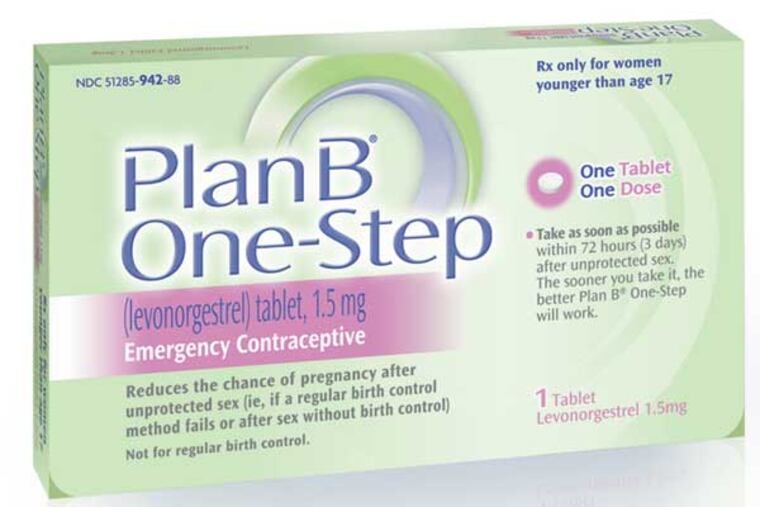What is government's role on teen sex?

Lyle Denniston looks at the rights of parents and children in the decision to potentially allow younger teens to buy Plan B contraceptives.
The statements at issue:
"Americans may disagree about what is sexually appropriate for their children. And everyone surely wishes to prevent children from having babies. But public policy should be aimed at involving, rather than marginalizing, parents. … The debate about Plan B is fundamentally about whether government or parents have ultimate authority over their children's well-being."
– Kathleen Parker, Washington Post columnist in an op-ed article on May 5, titled "Prude or prudent?" commenting on the Food and Drug Administration decision to make the pregnancy-preventing drug Plan B available over-the-counter and without a prescription to girls as young as 15.
"This case involves the constitutional right to obtain and use contraceptives. The restriction on the sale of time-sensitive [Plan B] contraceptives to pharmacies and health clinics, which affects all women, implicates this right."
– Senior U.S. District Judge Edward R. Korman of Brooklyn, New York, in a decision on April 5 in the case of Tummino v. Hamburg, ordering the Food and Drug Administration to remove all age and retail sale restrictions on the availability of Plan B pills.
We checked the Constitution, and...
The Constitution, of course, does not set up the federal government as a super-parent to the nation's children, displacing their own parents. When the Constitution is understood to protect rights for children, it is not a zero-sum game: Just because children—especially teenagers—have rights, does not mean that parents must give up their own rights.
A child with rights is on the way toward becoming a better citizen—surely a goal that most parents support. And the Constitution makes room for parents to shape how their children use the rights that they have; having rights includes the opportunity to learn how to use them sensibly, and parents surely can teach those lessons.
The factual reality is that teenagers do have a constitutional right to obtain contraceptives, under a 1977 Supreme Court decision in the case of Carey v. Population Services International. In that ruling, the court took note of studies that showed that "with or without access to contraceptives, the incidence of sexual activity among minors is high, and the consequences of such activity are frequently devastating."
Not all members of the Supreme Court have joined in what has been a steady expansion of free-standing rights for minors. Two years ago, for example, Justice Clarence Thomas wrote that "the historical evidence shows that the founding generation believed parents had absolute authority over their minor children and expected parents to use that authority to direct the proper development of their children." But that was a view that he alone expressed, in a case in which the majority recognized a right of minors to have access to video games that had violent content.
The more prevalent constitutional understanding is that children, while they are more vulnerable and impressionable and thus need substantial parental protection, may also be in need of protection by government. The more important to a child's personal identity a constitutional right may be, the more likely courts will respect it as an independent right. That certainly has been true in disputes over a constitutional right of a minor to access to birth control, and to abortion.
A teenage girl's interest in avoiding pregnancy, or in dealing with a pregnancy after it develops, is of constitutional dimensions, the courts have said, precisely because it is vital to her development and her chance to grow at a more measured pace into maturity. Most parents, no doubt, want that for their daughters, and a government policy that makes preventive or corrective measures more accessible is aimed at reinforcing both the girl's interest, and her parents support for that interest.
In the Plan B controversy, two opposing views of a policy of greater access have brought out fundamentally different cultural perspectives. There are those, like columnist Kathleen Parker, quoted above, who see such a policy as almost certainly intruding on parental authority, as a government-knows-best approach. Others, even more hostile to Plan B access, argue that such access inevitably will encourage younger and younger girls to engage prematurely in sexual activity.
But on the other side, advocates of greater access to Plan B are persuaded that teens are going to enter into sexual activity at earlier ages as social trends change and not as a result of the availability of contraceptives, and that the role of government is to provide them with a means to protect themselves after they have been drawn into sexual activity.
The role of the Constitution is not to reconcile those different perspectives; indeed, the opposing views start from such fundamentally different views of government that they may not be capable of reconciliation under any circumstances.
But the Constitution might have a mediating effect between such polar opposites, if Americans were able to develop a stronger habit of seeing constitutional rights not as a relaxation of all restraint, or as an invitation to indulge whimsically in excess, but rather as a gateway toward social and civic maturity. That might start at a very simple level, perhaps as simple as having a dinner-table conversation about what it means to have rights in the first place.
Lyle Denniston is the advisor on constitutional advisor for the National Constitution Center. He has reported on the Supreme Court for 55 years, currently covering it for SCOTUSblog, an online clearinghouse of information about the Supreme Court's work.